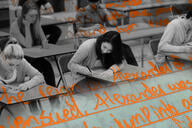You have /5 articles left.
Sign up for a free account or log in.
James Dilmore, chairman of Florida State University College Republicans, traveled to Washington alone last week to attend Donald Trump’s inauguration Friday but came with no plans to hobnob with other conservatives throughout the weekend.
“That's not who I am. I'm not part of the establishment. I'm not one of those people. That's who I hate. That's why love Donald Trump,” he said. “I’m not an aristocrat. I’m not an elitist.”
Trump’s inauguration as the 45th president brought about 250,000 people to the Capitol Friday -- about a quarter the size of the crowd that attended Barack Obama’s second inauguration in 2013. The incoming president lags his predecessor in enthusiasm levels among college voters and typical college-age voters, in particular.
But Dilmore said there was a positive reaction to Trump’s election on the Florida State campus and the experience of being at the inauguration Friday resonated deeply.
“I want to help expand the message of conservatism at Florida State to college kids,” he said. “I have no intention in my mind of ever trying to be that upper-class elitist. I just want to get people’s interest and get people involved and let them know they’re not alone.”
Dilmore said he wanted to see a repeal of the Affordable Care Act and stronger border security but Trump’s “renegade,” anti-elitist message was at the heart of his appeal.
Trump’s victory in the Republican presidential primary sharply divided Republican groups on many college campuses last year. College Republican groups took heat at campuses like American, Harvard and Princeton Universities and other places over decisions to withhold endorsements from Trump in the general election after a campaign filled with rhetorical attacks on women, African-Americans, Latinos, Muslim immigrants and other minority groups.
After refusing to support the party’s nominee for the first time in more than a century, the Harvard Republican Club took heat from conservatives on and off campus. Cameron Khansarinia, the Harvard student body vice president and a campus Republican leader when that decision was made, said in response to the criticism last year that Trump did not have the right character or temperament to lead the country. After the inauguration, he said many of those concerns persisted.
“One can also hope his actions will overshadow the terrible things he's said,” Khansarinia said.
The group did see many policy areas where it hoped Trump would work with the GOP Congress, he said, including tax reform and repeal of the Affordable Care Act.
“Hopefully the office of president will have an impact on him and he will rise to the occasion,” he said.
Another controversy over Trump unfolded at Penn State University, where a breakaway campus conservative group formed after the College Republicans leadership there voted not to endorse Trump in the general election. But Michael Straw, the Penn State College Republicans president, said with the election over, the organization would support Trump going forward.
“Just because we didn't endorse him doesn't mean we aren't going to support him now. He did win,” Straw said.
Straw said the group will focus on areas where Trump agrees with congressional Republicans on policy, whether on tax policy or other issues. He said he personally supported continued federal funding for Planned Parenthood, for example, but expected the campus group to focus on consensus issues for conservatives going forward.
Overwhelmingly on the Penn State campus, Trump remains unpopular. Straw said he would urge other students to take the same position as his group on the inauguration, however.
“A lot of people at Penn State are negative, but I would tell them, you want your president -- no matter who they are -- to be successful,” he said. “I did not support Donald Trump, but he is our president. So we need to look forward and hope for the best for what he does.”




